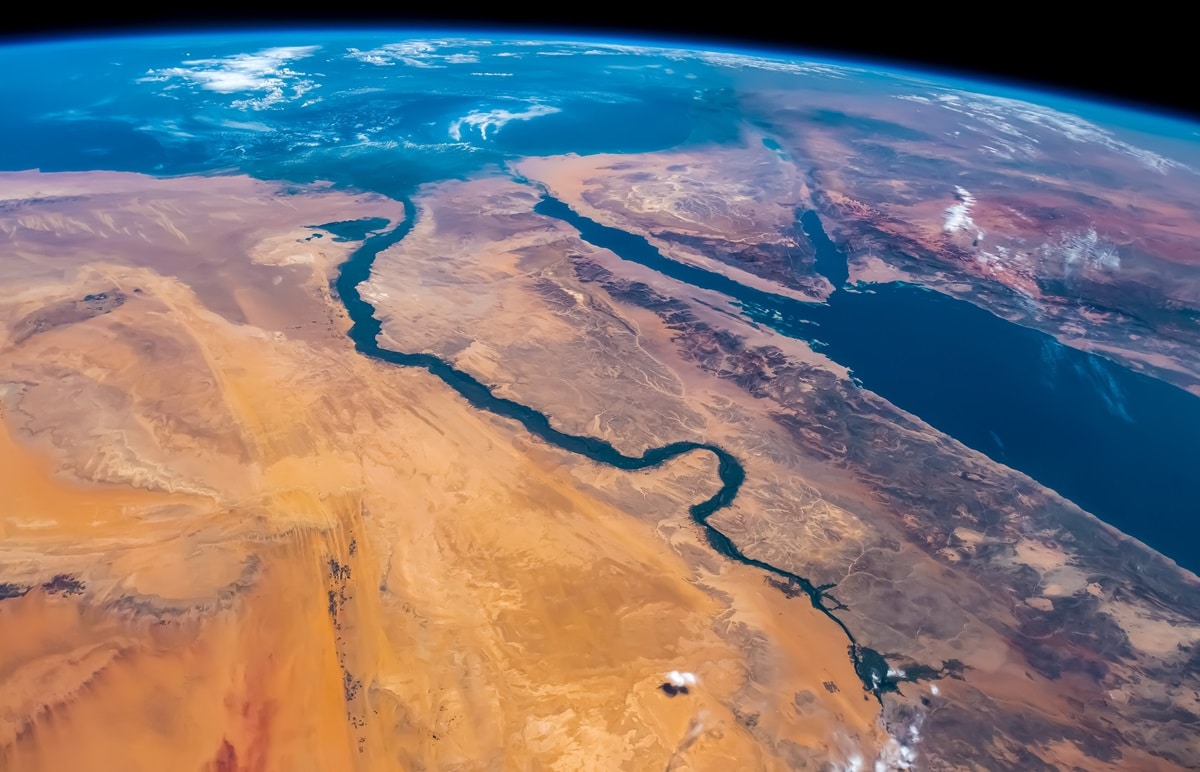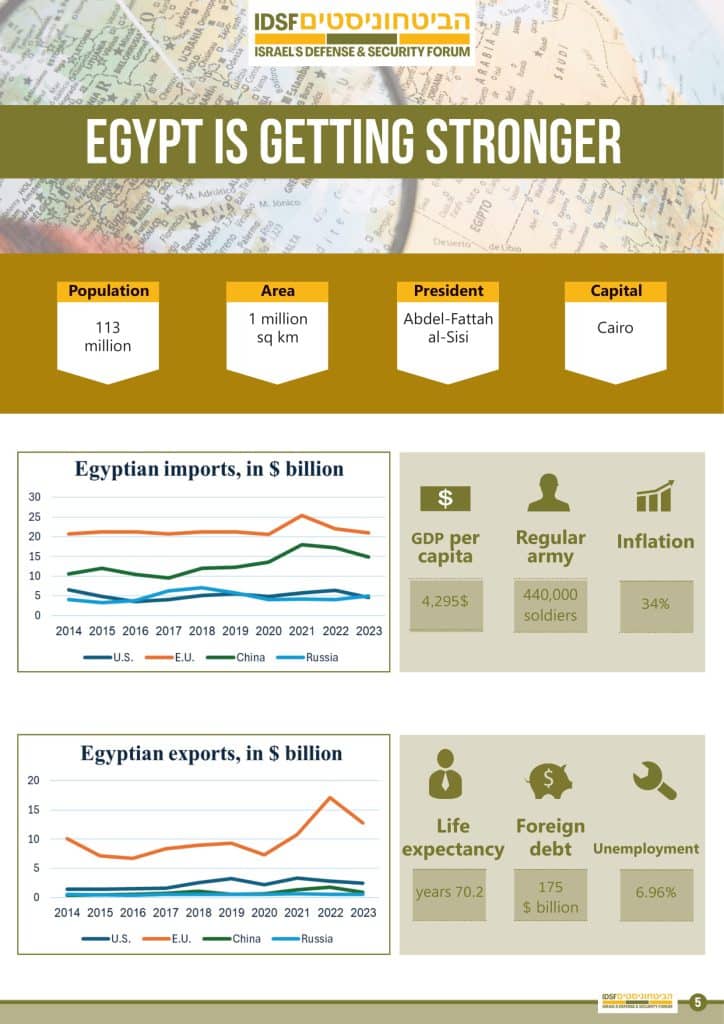
Executive Summary
The complicated relations between Israel and Egypt go back to long before the establishment of the Jewish state. At first, Israel and Egypt were bitter enemies. The two nations fought five wars, all of which ended favorably for Israel, though it sustained heavy losses and endured difficult battles. But after the 1977 peace initiative, when Egyptian President Anwar Sadat visited Israel and addressed the Knesset, relations changed, climaxing in the signing of a peace treaty in 1979. Since then, Egypt and Israel have collaborated in different areas, including economic ventures (joint ventures, such as gas exports from Israel to Egypt) and security (fighting ISIS in Sinai and destroying Hamas tunnels between the Gaza Strip and Egypt). Furthermore, Israel has leveraged Egypt’s status to act as a mediator with Hamas in the various rounds of fighting between the sides. The present war between Israel and Hamas poses challenges and opportunities before the two nations at a time when Egypt is undergoing processes producing other challenges and opportunities. These may be divided into two: those affecting the near future and those with implications for the long term.
The Near Future: The Swords of Iron War
Given the events of the war, Egypt is a potential ally, and cooperation with it is both vital and necessary to determine the post-war reality in Gaza and attain the goals of the war. Relations are somewhat tense, mostly because of Egypt’s obligation to support the Palestinians, the Egyptian worry that Palestinians from Gaza will enter Sinai, and the concern that the war might result in threats to Egypt’s internal stability (to date, unlike Jordan, the situation has been relatively calm). However, generally speaking, Egypt is one of the Arab nations with the greatest potential for cooperation due to its strong ties with the West and the United States, as well as its rivalry against the Muslim Brotherhood. In this context, immediate challenges and opportunities in Israel’s relations with Egypt include:
- Cooperation with Egypt in achieving the goals of the war: Egypt borders the southern Gaza Strip and controls the Philadelphi Corridor, a 14-km. long passage roughly 100 m. wide, which constitutes the major smuggling route for most of Hamas’ – and the other Gazan terrorist organizations’ – weapons. To achieve the war goals – destroying Hamas and rescuing the hostages – Israel must continue its ground maneuver in Rafah, seize the Philadelphi Corridor, and maintain control of it after the war is concluded. In light of Egypt’s opposition to Israel’s plans and the threats it has issued, Israel must strive to reach agreements with the Egyptians about future actions, which will allow Israel both to realize its goals and demonstrate maximal sensitivity to Egypt’s interests and desires. Moreover, the tension around the IDF’s entrance to Rafah, the increased stridency of Egypt’s tone, and its desire to keep Hamas from achieving any gains, may enable Egypt to play an important mediating role in achieving a hostage release deal. And, in fact, Egypt has finally taken the baton from Qatar in leading the hostage negotiations, is in direct communication with Sinwar, and is proposing new compromises. At first, it was to keep Israel away from Rafah, but now it is aimed at ending the fighting.
- Leveraging economic aspects: Egypt has been mired in an economic crisis since long before the war in Gaza, with high inflation (34% in 2023), high poverty rates (29.7% in 2019), widespread devaluation of the Egyptian currency, and a foreign debt crisis (estimated at more than $165 billion). At the same time, President al-Sisi is carrying out grandiose projects costing billions with no immediate payoffs; these include the New Administrative Center, a new Nile Delta development, and a new seaside city. In the meantime, the construction of the Grand Ethiopian Renaissance Dam, which spans the Blue Nile – the most important tributary of the Nile, along whose banks most of Egypt’s population lives – is raising the risk not only of creating new problems but also exacerbating existing ones, such as increased unemployment, higher food prices, higher energy costs, and decreased agricultural output. Israel can use economic tools such as its gas exports, its ties with the United States, and its diplomatic relations with Ethiopia to help Egypt face its issues in exchange for promoting Israel’s interests in the war and gaining Egyptian support for them, including willingness to allow passage through Egypt to refugees from Gaza.
- Using the Houthis’ activities to Israel’s ends: The Houthi attacks on ships at the gateway to the Red Sea have resulted in a dramatic drop of some 40 percent in Egypt’s revenues from the Suez Canal. In light of this, Israel can and must enlist Egyptian support for military action against the Houthis begin taken by Western nations for the sake of shared goals, such as degrading the capabilities of the Houthis and Iran, which provides their financing and guides their actions.
- Enlisting the West: At the same time, the United States and the European Union have, like Israel, the ability to influence Egypt. U.S. aid to Egypt currently stands at $1.3 billion a year (Egypt requested $1.44 billion for 2024), and the EU has extensive loans, investments, and arms deals there. If the political will is there, they will be able to influence Egypt to spearhead a change in Egyptian policy touching all issues related to the war in Gaza. This requires a change in policy on both the part of the U.S. administration and the EU. It should be noted that any pressure must be applied with care and moderation lest Cairo be pushed to trade in the West’s economic support for China’s, whose commercial ties with Egypt have grown in the last decade.
The Long-term View
For the long term too, it is reasonable to assume that Egypt’s commitment to the pragmatism that currently characterizes it and to the bloc of moderate Sunni Arab nations as well as the relationship with the United States and the West will last. Thus, its commitment to the peace treaty with Israel and opposition to the Muslim brotherhood as well as support for the Palestinians will also continue.
Nonetheless, Israel’s partnership with Egypt cannot be taken for granted. At present, Egypt is experiencing several processes and trends (military buildup, tensions with the United States, winks and nods to Russia and China) that raise the concern about the future of Israeli-Egyptian relations. Therefore, Israel must keep its eyes open and have contingency plans available in case of change, as well as a solid intelligence assessment and military force construction tailored to circumstances. In this context, challenges and opportunities in relations with Egypt over the long term include:
- Improved relations with problematic regional elements (“the axis of evil”): Given the decrease in U.S. support in recent years and doubts about the administration’s commitment to defend U.S. allies, Egypt has expanded its policy of diversifying its military supply sources and is now buying weapons and munition worth billions of dollars from many nations, including Russia and China, both of which have increased their investments in Egypt. A continued drop in U.S. and Western support and closer ties with other nations as well as the unsure, deferential approach the West is taking towards the axis of evil might push Egypt towards agreements with those nations. Furthermore, there is a thaw in relations with Iran and the countries associated with the Muslim Brotherhood, i.e., Qatar and Turkey, with which Egypt had tense relations until quite recently. Right now, this growing closeness looks like a tactic designed to improve Cairo’s bargaining power and strengthen its regional standing and ability to handle its economic challenges. But should this continue and turn into Egypt’s new strategy, it will have worrying implications for Israel’s security and damage the West’s zone of influence.
- Egyptian military buildup: Even as the nation has hewn to the peace agreement and maintained security cooperation with Israel, the Egyptian army has for many years been undergoing modernization and force construction processes: it has armed itself with many advanced weapons systems, upgraded its infrastructures, and improved its training programs. These processes create the potential for posing a threat to Israel’s security especially because Israel is not preparing for the possibility of Egypt turning from a potential to a real threat. After the war ends, the Israeli government and security establishment must hold a strategic discussion about Egypt and examine how best to prepare from such an eventuality, and especially what must be done now, e.g., improving intelligence familiarity with the Egyptian army’s capabilities.
The peace agreement: At present, there doesn’t seem to be a real danger of the peace agreement being suspended or abrogated despite differences of opinion about Israel’s actions in Rafah. Nonetheless, Israel must consider that the ongoing and worsening economic crisis in Egypt, especially those aspects affecting the younger generation and the educated classes, as well as the anti-Israel public sentiment that the Egyptian government isn’t doing enough to support the residents of Gaza might lead to protests. Such protests might grow to a scope that will make it difficult for the government to control, affect Egypt’s decision-making processes on all matters, including those related to the war, bilateral relations, and the peace agreement. In the extreme scenario, popular protests might lead to regime change and the rise of a government that does not favor maintaining the peace agreement with Israel. In tandem with this possibility, Israel must try to forge closer relations with Egypt and increase Egypt’s dependence on it, using its economic leverage and political tools. This would preclude the scenario of the peace agreement being violated no matter what government happens to be in power, just as the Muslim Brotherhood government led by Muhammad Mursi refrained from doing so.

